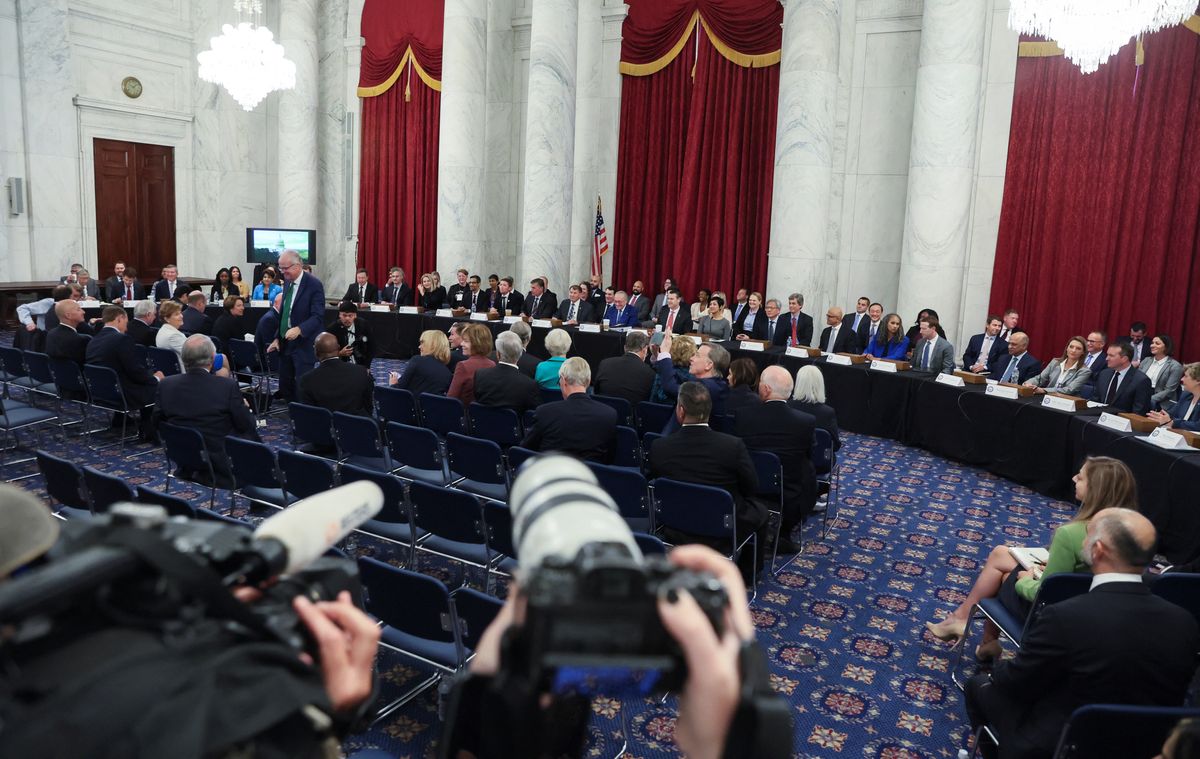Tech giants meet to talk about AI regulation
On Wednesday, leaders of global tech giants met at the White House to talk AI regulation with US lawmakers.

A few minutes every morning is all you need.
Stay up to date on the world's Headlines and Human Stories. It's fun, it's factual, it's fluff-free.
The backstory: With the rise of artificial intelligence (AI) triggered almost a year ago has come concerns over its dangers. Generative AI can help us progress in a lot of areas, like in science and health, by being able to process a ton of data and information at once. On the other hand, these abilities also mean that AI can be risky.
There are a lot of potential problems that AI presents– the creation and spread of misinformation, the possibility of it overtaking humans, surveillance/facial recognition issues, gender and racial bias, how it can be used in a court of law, how it might affect employment and the economy, plagiarism and intellectual theft, the dangers of AI-driven cars … the list goes on. But, with so much AI-powered tech taking off so quickly, it’s hard for world governments to regulate it and keep up with its advances.
More recently: In May, hundreds of leaders in the world of AI tech released a joint statement describing the threats that this technology presents. OpenAI, Google’s DeepMind, Anthropic and Microsoft execs all signed the statement. Even with governments and AI developers agreeing on the need to put some rules in place, not everyone agrees on what these policies should look like.
The US is taking a step back to get a better idea of what aspects of AI tech would need regulations that aren’t already covered by the law. Meanwhile, the EU and China are both taking more proactive approaches to deal with AI head-on. In August, China put forward a set of temporary policies to regulate generative AI, calling on service providers to fill out security assessments and get clearance before launching mass-market AI products.
The development: On Wednesday, leaders of global tech giants met at the White House to talk AI regulation with US lawmakers. The meeting was called the “AI Insight Forum,” and featured recognizable faces like Mark Zuckerberg, Elon Musk, Bill Gates, Sam Altman, Sundar Pichai and others. Labor union leaders and reps from outside organizations were also invited. Senate leader Chuck Schumer from New York led the discussion.
The idea behind the event was to educate Congress on the technology. Some highlights include Pichai describing AI’s potential for health and energy progress, Zuckerberg stressing the importance of open and transparent AI systems and Musk and former Google CEO Eric Schmidt pointing out the existential risks of AI. One of the major actionable ideas that came up was the creation of an independent agency to supervise the development of AI technology.
Key comments:
“Mitigating the risk of extinction from AI should be a global priority,” the AI joint statement from May said. “alongside other societal-scale risks such as pandemics and nuclear war.”
“The key point was really that it’s important for us to have a referee,” said Elon Musk, CEO of Tesla and X, during a break in the meeting. “It was a very civilized discussion, actually, among some of the smartest people in the world.”
“I don’t know why we would invite all the biggest monopolists in the world to come and give Congress tips on how to help them make more money and then close it to the public,” said US Senator Josh Hawley, who refused to attend the event.
“This is the most difficult issue that Congress is facing because AI is so complex and technical,” Chuck Schumer said in an interview.




Comments ()